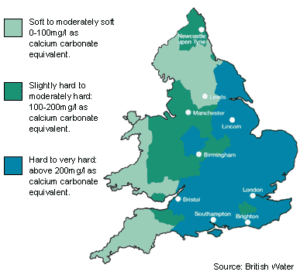- UK areas with hard water are most likely to be hit with higher energy bills
- Bedfordshire, Hampshire, Kent, and Surrey are all reported to be high water areas
- Hard water can lead to boiler and appliance damage – and can even fade your clothes
Hard water affects 60% of UK households, however research shows that some areas are worse than others – and could face higher energy bills as a result.
Hard water has a higher mineral content, over 200mg of calcium carbonate per litre. The geology of the area your water supply comes will determine the water hardness in your area, meaning there’s no control over the distribution.
The consequences of living in a hard water could result in higher energy bills, appliance maintenance, and replacement costs.
However, experts at BoilerCentral.com have revealed some tips and tricks for tackling hard water in a bid to keep costs down.
A spokesperson said: “Hard water can be a nuisance, as the minerals cause limescale to build up, which can cling to parts of your boiler and clog central heating pipes, making them lose their efficiency. Limescale can also damage your household appliances such as kettles, dishwashers, and irons.
“However, there are solutions to help tackle the problem, including installing a water softener, having regular boiler checks, and making some easy switches around the home.”
Which areas have the hardest water areas in the UK?
Publicly available data reveals the UK counties with the hardest water.
| County | Water Hardness Level |
| Bedfordshire | Hard to very hard water |
| Berkshire | Hard to very hard water |
| Buckinghamshire | Hard to very hard water |
| Cambridgeshire | Hard to very hard water |
| Dorset | Hard to very hard water |
| Essex | Hard to very hard water |
| Gloucestershire | Hard to very hard water |
| Greater London | Moderately hard water |
| Hampshire | Hard to very hard water |
| Hertfordshire | Hard to very hard water |
| Kent | Hard to very hard water |
| Oxfordshire | Hard to very hard water |
| Surrey | Hard to very hard water |
| Sussex | Hard to very hard water |
| Wiltshire | Hard to very hard water |
How to tackle the effects of hard water
Install a water softener – Water softeners can be costly to install but could drastically save you money if hard water is damaging your appliances and hiking your energy bills. The average cost of water softener ranges from £500 to £1,600, however there are options to pay monthly or set up an annual subscription.
Get a water filter – Hard water can sometimes taste like chalk or chemicals due to the high amount of minerals it contains. When you filter water to remove the minerals, you are left with clear water with no chalky taste or smell.
Avoid high temperature settings on appliances – If you have a dishwasher, our experts advise using cooler washes to avoid your dishes drying with water stains. The same applies to washing machines, as hard water can also damage your clothes. Keep to a cool wash to avoid them feeling ‘starchy’ and quickly fading in colour.
Apple cider vinegar – If you’re dealing with existing limescale, apple cider vinegar can work like a treat when it comes to removal.
Change your shower head – Hard water can also have a huge impact on your skin, leaving it dry and flaky. To help soften the water from your shower, you could try an ion exchange shower head filter. This will help to remove contaminants like chlorine and lead from the water.
Regular boiler maintenance – While we can often see the limescale building on our appliances, we can’t always see it in our pipes and boilers. To avoid the hefty cost of a boiler replacement, keeping up to date with an annual service will help ensure it’s in good condition. Bleeding your radiators and turning your boiler on and off for a few minutes during summer can also help you become more aware of hidden damage.
Further information can be found at boilercentral.com
Help keep news FREE for our readers
Supporting your local community newspaper/online news outlet is crucial now more than ever. If you believe in independent journalism, then consider making a valuable contribution by making a one-time or monthly donation. We operate in rural areas where providing unbiased news can be challenging. Read More About Supporting The West Wales Chronicle



















